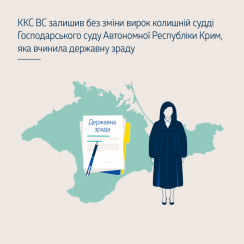Contact center of the Ukrainian Judiciary 044 207-35-46

The Criminal Cassation Court of the Supreme Court upheld the guilty verdict against a former Ukrainian judge who continued to administer justice in occupied Crimea. The district court sentenced her to 12 years' imprisonment with confiscation of all her property for high treason (Article 111(2) of the Criminal Code of Ukraine). The court of appeal upheld the verdict.
The convicted woman, serving as a judge of the Commercial Court of the Autonomous Republic of Crimea, was found guilty of intentionally assisting the Russian Federation in conducting subversive activities against Ukraine, to the detriment of its sovereignty and territorial integrity.
In the cassation appeal, the defence lawyer argued, among other things, that the actions of the convicted person did not constitute treason because during the trial in absentia and without questioning his client, it was impossible to find out whether she had acquired Russian citizenship or had become a judge in a court operating in the occupied territory (in Crimea). The defence lawyer also pointed out that the provisions of the Criminal Procedure Code of Ukraine regarding the possibility of trial in absentia of persons who are on the territory of the Russian Federation without being on the international wanted list are not based on the principle of non-discrimination and are not in conformity with Article 1, paragraph 1, of Protocol No. 12 to the Convention for the Protection of Human Rights and Fundamental Freedoms.
The Criminal Cassation Court of the Supreme Court examined these arguments and rejected them. In particular, the courts used the information from the official websites of the President of the Russian Federation and the Supreme Court of the Russian Federation on the activities of the courts in the territory of the Autonomous Republic of Crimea, as well as court decisions issued by the convicted person on behalf of the Russian Federation to confirm the fact that she was administering justice.
The Criminal Cassation Court also stated that in order to conduct a special pre-trial investigation in respect of a suspect located in the temporarily occupied territory of Ukraine, the provisions of clause 20-1 of Section XI "Transitional Provisions" of the Criminal Procedure Code of Ukraine (as amended by Law of Ukraine No. 1355-VIII of 12 May 2016, effective at the time of the procedural actions) did not require that the suspect be put on the interstate and/or international wanted list.
At the same time, in accordance with international legal acts and national legislation, the temporary occupation of a part of the territory of Ukraine as a result of Russia's armed aggression does not change the status of the Autonomous Republic of Crimea, and the Autonomous Republic remains the territory of the sovereign state of Ukraine.
Therefore, the panel of judges of the Criminal Cassation Court of the Supreme Court is of the opinion that in this criminal proceeding the conduct of a special pre-trial investigation against the suspect, who was permanently residing in the temporarily occupied territory of Ukraine - the Autonomous Republic of Crimea, without placing her on the international wanted list, is in accordance with the provisions of the Criminal Procedure Code of Ukraine and cannot indicate a violation of the guarantees prohibiting discrimination.
The Resolution of the Criminal Cassation Court of the Supreme Court of 22 August 2023 in case No. 759/4148/17 (proceedings No. 51-1893км23) - https://reyestr.court.gov.ua/Review/113065878.
This and other legal positions of the Supreme Court can be found in the Database of Legal Positions of the Supreme Court - lpd.court.gov.ua/login.